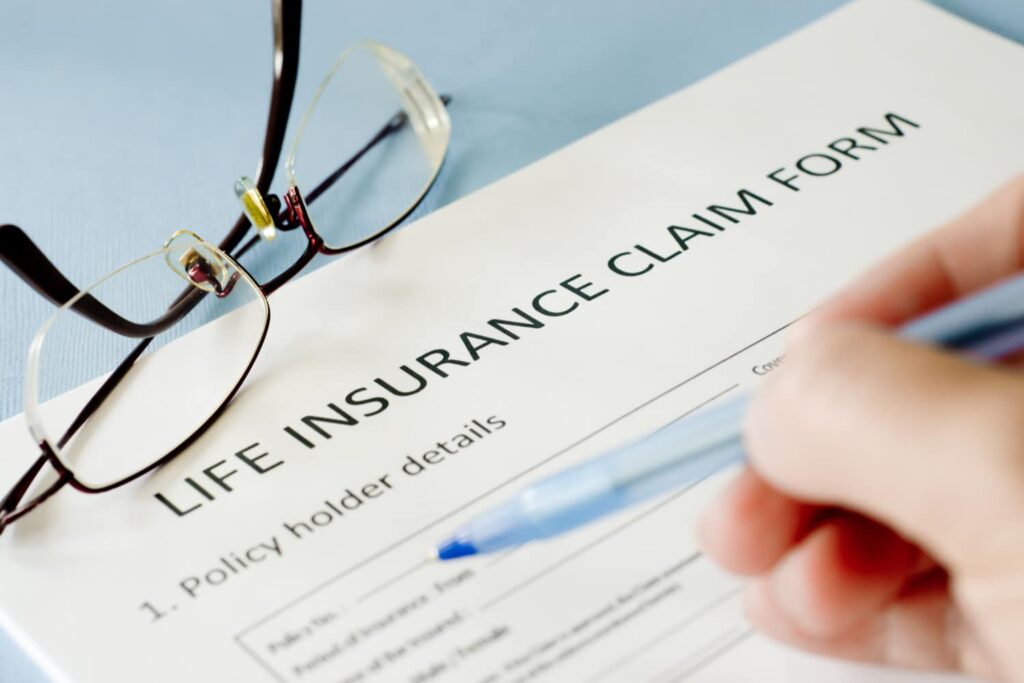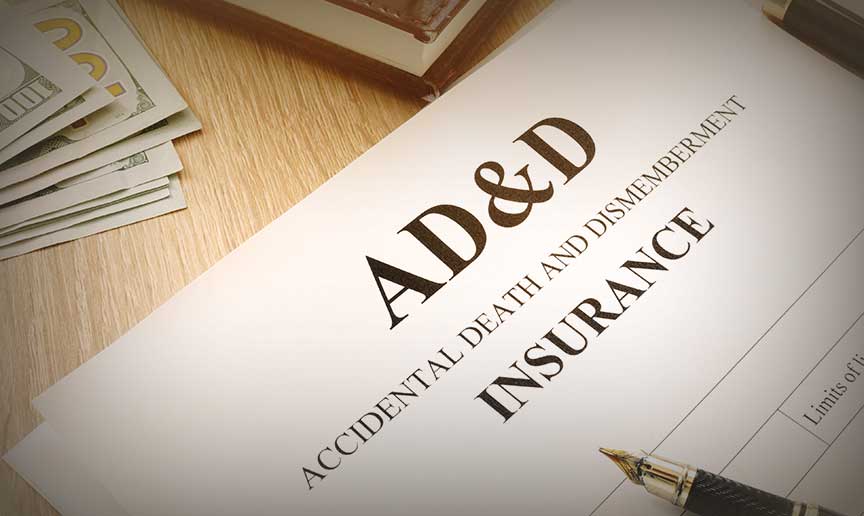Buying a traditional life insurance policy with a criminal past may not be easy, but is it not impossible, either. And, if traditional life insurance is out of reach, there are other options still available.
In some situations, you will still qualify for life insurance even if you have a criminal record. However, you are likely to pay a higher premium rate than someone without a criminal record.
Keep reading to find out how a felony impacts your chances of buying life insurance.
What is life insurance?
A contract between you and a life insurance provider is known as a life insurance policy. They agree to pay a death benefit (a lump sum of tax-free money) to someone you pick if you die. In exchange, you agree to pay them an insurance premium on a regular basis: (a small amount of money over time).
You and your partner decide on the quantities of money coming in and out, as well as the time frames involved, but that’s it in a nutshell.
What can a life insurance claim payment be used for?
Your beneficiary (the person you choose to receive the payout) is allowed to utilize the death benefit from your life insurance in any way they see fit. The death benefit is exempt from taxation. They can put the money towards:
- Covering day-to-day expenses so that their family can maintain a similar standard of living (groceries, bills, rent, etc.)
- Pay off your credit card debt (mortgages, lines of credit, credit card bills, business loans, etc.)
Invest in the education of their children. - Make a significant donation to their favorite charity.
- Make arrangements for their funeral.
- Keep their company safe.
If you don’t choose a beneficiary, the death benefit will be paid to your estate, which may be subject to taxation.
Do I need life insurance?
Perhaps a better thing to ask is whether or not the people in your life require it. Insurance is used to pay off debts (personal or business-related) and provide a source of income to someone who relies on you but is no longer alive.
By purchasing life insurance, you can secure assets for your family’s future by investing in a secondary source of income. Without life insurance and the security of a death benefit, you’re putting all of your family’s financial eggs in one basket: your ability to produce an income while you’re alive.
You may believe you have life insurance through your employer’s group benefits, but such policies must be scrutinized carefully to ensure they cover all of your needs.
How much life insurance do I need?
You should purchase the most comprehensive life insurance policy you can afford. When they die, most people want to leave a multimillion-dollar fortune to their family and loved ones. However, most people are unable to do so due to budgetary constraints.
Determine what you consider to be an “affordable premium.” Create a budget to examine your family’s existing and future financial needs, as well as your current liabilities and debts, as well as any costs related to your death. This will show you what kind of coverage you should get and how much it will cost.
When should I buy life insurance?
Life events necessitate the purchase of life insurance. Purchasing a home, having children, and marrying are all signs that you have people in your life who rely on your salary to maintain their standard of living. Because insurance premiums climb as you get older, buying it earlier in life can save you money.
Do life insurance companies check criminal records?
Most life insurance companies will check criminal records before insuring you. But, depending on the crime, your premiums may not change at all.
How does a criminal record affect your life insurance application?
Life insurance carriers will ask you the following two questions about your criminal history when you apply:
- Are you presently being charged with a criminal offence?
- Have you ever been convicted of a felony?
Your answers will impact your insurability and your premium rate. You should always answer the questions on your insurance policy application truthfully. Criminal records do not go away. Insurance providers are likely to do their own research, which will reveal if you have a criminal record.
Should you be dishonest on your application, the insurer is likely to deny you coverage. Furthermore, being denied coverage for lying could mean that other providers will not accept your application, either.
Let’s look at how different scenarios can impact acquiring life insurance.
You are presently being charged with a felony offence
Life insurance companies will not offer you a life insurance policy while you are on trial. We recommend postponing your life insurance application until any charges against you are dismissed.
You have been convicted of a crime in the past
Every insurance carrier handles felonies differently. For some providers, a felony is uninsurable. Others, however, are not so rigid. Life insurance companies that do extend coverage to applicants with a criminal record, do so on a case-by-case basis.
The insurer will consider several factors, including the type of crime committed, its severity, how much time has elapsed since the applicant’s last conviction, whether they served time in prison, and, if so, for how long. If you have been convicted of a felony and are looking for life insurance, it might be in your best interest to work with an agent or broker who deals with high-risk applicants.
You are presently in jail or on probation
Life insurance company would not offer a life insurance policy to someone whose in jail or on probation. Some insurance carriers will extend coverage only if at least one year has passed since the completion of the probation period. Some other providers, however, have a longer waiting period. We recommend you do not apply for life insurance if you are presently in prison or on probation.
You have been convicted of a misdemeanour
A misdemeanour is a crime that is less serious than a felony. Examples include shoplifting, trespassing, petty theft, disorderly conduct, etc. A misdemeanour is likely to affect neither your insurability nor premium rates since life insurance companies do not treat them as a serious crime. If you have been convicted of a misdemeanour or a smaller infraction, were commend you apply as a normal applicant would. However, if you are not sure about your record, consider speaking to an independent broker or agent first.
How to be insured as a felon
If you have been convicted of a felony, getting life insurance may not be as easy as it would be for someone without a conviction. Since a criminal record never disappears, you will always pay a higher premium.
Unless you have been convicted of a serious crime — such as murder, rape, kidnapping, child molestation, or drug trafficking — there isa good chance life insurance will be available to you. Here are a few things to keep in mind while applying for life insurance if you have a felony on your record.
-
Postpone buying a policy for as long as possible
Some life insurance companies will not agree to offer you a policy until a year has passed from the date your probation ended. Other providers have a longer waiting period, like 2 years, 5 years, or even 10 years. The longer you put off buying a policy after coming out of jail or completing probation, the better.
A bigger time gap between your life insurance application and the felony may improve your chances of being accepted. This is because insurance carriers want to see that you have changed before offering you a policy. For instance, a convicted felon who has been a law-abiding person for seven years is likely to be considered a lower risk than someone who was only released from jail 13 months ago.
Even though the cost of life insurance goes up with age, the increase is not likely to be as much as it would be if you applied for life insurance soon after the completion of the probation period.
If you need a life insurance policy right now, a short-term plan might be a good fit. For example, it might be worth the cost if you have just had your first baby and want to ensure your family will be able to stay afloat in your absence. Once a considerable period has passed since the completion of your probation period, you can reapply and take out a new policy at a lower rate.
-
Pick the right agent or broker
Different insurance carriers treat felonies differently. An experienced broker can help you identify providers who are more likely to grant you a policy. So, instead of applying on your own, you are likely to be better off working with an agent or broker if you have a less-than-perfect past.
-
Look at other options
If a felony on your record makes traditional life insurance inaccessible, consider a group policy, a guaranteed issue plan, or an accidental death and dismemberment policy. Each one of these is discussed in detail in the next section.
Alternatives to life insurance for felons
If a traditional policy is out of reach, consider these options:
Group life insurance
If your employer offers group life insurance as part of its employee benefits package, sign up for a policy without hesitation. Since applicants do not have to take a medical exam or disclose their criminal past, felons can easily receive coverage.
Moreover, employers often provide the benefit for free, and you have the option to purchase additional coverage. Even when you must pay for group life out of pocket, signing up for it makes sense. This is because group life insurance rates are much lower than those of individual life plans.
The maximum coverage amount available is usually one or two times your annual salary. For most people, that may not be sufficient, but something is better than nothing. Other drawbacks include a lack of flexibility and portability.
You cannot customize a group life plan by adding certain riders to suit your specific needs. And if you lose or leave your job, the policy is likely to be terminated. For these reasons, group life insurance is not a substitute for an individual policy, though it can complement it nicely.
Guaranteed Accepted Life Insurance
Guaranteed accepted life insurance is a kind of permanent life insurance. That is, it provides the coverage you cannot outlive. It is also referred to as final expense insurance or no-medical life insurance.
There is a reason why this life insurance product has the word “guaranteed” in its name. Acceptance is guaranteed if you are in a particular age group, meaning the insurer cannot turn you down on account of poor health or a criminal past or any other reason. The upper age limit is usually 70, but some insurers have a higher cap.
Since the provider does not investigate your insurability, there are none of the medical exams or health questions that are part of a traditional life insurance application. If you meet the age requirement and can afford the premium, getting coverage is easy.
Simply, grab quotes from several providers and pick the best option. Compared to traditional plans, which can take up to six weeks for approval, guaranteed issue policies can be approved within a few days —sometimes even on the same day.
However, despite these conveniences, guaranteed acceptance insurance should still be your last option. Consider it only if you do not qualify for a fully underwritten individual life policy or a group life policy. This is because:
- It is much costlier than traditional policies. In the case of a guaranteed issue, the insurer has very little information about you to go by. So, the insurer assumes extra risk by insuring you, which it compensates for by charging you a higher premium rate.
- The coverage amount is rather small. Generally, the maximum death benefit amount is $25,000. However, some providers are willing to cover your life for up to $50,000. Because of the small benefit amount, a guaranteed issue policy is suitable for neither income replacement or debt management. Most people who purchase this type of policy, use it to cover their end-of-life expenses, such as funeral costs, or to leave a small inheritance to their children or grandchildren.
- There is a waiting period involved. Typically, the waiting period is two years, but it can be longer depending on the insurer. If you die from natural causes within the waiting period, the insurer will not pay the coverage amount but refund the policy premiums. Accidental deaths, however, are covered during the waiting period.
Accidental Death and Dismemberment
While accidental death and dismemberment is not a life insurance product, it can help felons ensure their loved ones receive financial help if they die or are seriously injured in an accident. It pays your beneficiary an agreed amount if you pass away due to an accident or incur a loss of limb, sight, or hearing. However, it does not cover death from illness, disease, or an underlying medical condition.
Conclusion
Having a criminal past does automatically make you ineligible for traditional life insurance. You cannot get life insurance if you are on trial, in jail or on probation, or if you have been found guilty of certain serious crimes such as murder, drug trafficking, rape, kidnapping, or child molesting. Life insurers may offer you a traditional policy if you are out of jail or have completed your probation.
However, you will have to wait at least one year before you can apply. If you do not qualify for a traditional policy, think about buying guaranteed issue life insurance, accidental death and dismemberment, or group life insurance.
Since providers consider applications with a criminal history on a case-by-case basis, you should consider speaking to an independent broker.
Which is the Best Life Insurance Policy?
The answer to this question isn’t found in the back of the book. Life insurance is a deeply personal purchase and there are many factors to consider. In addition to taking into account your current family’s financial needs, you should also account for future expenses like tuition, funeral arrangements, estate taxes, and any other debts you would like settled if you died. (If that sounds complicated, there are insurance calculators).
When you search for insurance quotes, there are a multitude of options to choose from. Nevertheless, you should only purchase a policy you can afford and that makes sense for you and your family.
Thankfully, AG Group Enterprise Ltd, is here to help! Our mission at AG Group is to provide a wide range of life insurance policies, including term coverage, permanent coverage, RRSPs, RESPs, and more!
With AG Group’s insurance policies, you can protect the future of your family and your finances. A good policy ensures a bright future!














